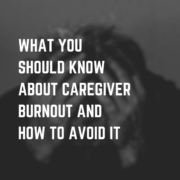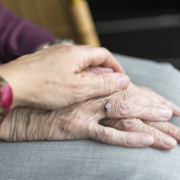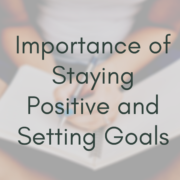What You Should Know About Caregiver Burnout and How to Avoid it
Taking care of a loved one can be one of the most rewarding experiences, especially if you have had a great relationship with that loved one. While the overall involvement in a senior loved one’s life as a caregiver might be satisfying and make you feel happy or proud of working together, there are times when it can lead to mental and emotional burnout. After all, you are constantly required to nurture and care for another human being which could cause you to forget to care for yourself, leading to “caregiver fatigue” or also known by the popular phrase, “caregiver burnout.”
According to the National Alliance for Caregivers, on average, family caregivers spend around 24 hours a week providing care for their loved ones. I personally was spending anywhere from 20-30 hours weekly while taking care of my grandmother. It really depended on the week and the needs that came up. But sometimes, it felt like much more time was being spent taking care of my grandmother rather than myself.
What I learned during the process was that the best way to avoid caregiver burnout was to identify when I felt I was going through it. Then, to prevent it. Which led me to highlight some signs linked to caregiver burnout.
Signs leading to caregiver burnout
The following signs point to caregiver burnout:
- Tiredness and a lack of energy for activities that you could, previously, easily perform.
- Having trouble sleeping.
- You no longer enjoy activities, specifically hobbies, that you loved.
- Relationships with loved ones start to become strained.
- Frequent headaches and/or body pain.
- You are easily irritable.
The above list of signs isn’t exhaustive but contains the most common signs that caregivers start to experience prior to or during burnout. While the above list is specific for emotional burnout, physical burnout is also important to avoid. Most caregivers face it from having to carry their senior loved ones from room to room or up the stairs or not getting proper sleep.
It is vital that our loved ones utilize technology that is available to them such as wheelchairs, canes, and even stairlifts for elderly persons to take that burden off of yourself. You can help with this by making a list of mobility or technology devices that can benefit both of your lives and take the stress off of your body. While your senior loved one may not be very keen on the idea of using mobility devices (not all are), you’ll need to reason with them why the device is a necessity for them and yourself. Hopefully, they’ll end up understanding the needs of both of you.
In any case of burnout, as soon as you start to experience the signs, it is important you take a step back and analyze why you may be burning yourself out. You need to ask yourself the following:
- Is being a caregiver for a loved one too much for me to handle while keeping my job and other responsibilities?
- Am I overly consumed with looking after a loved one that I no longer take time during the week for myself?
- Am I not eating well or finding time to exercise? This can take a toll on you both mentally and physically.
- Do I still have a healthy relationship with my loved one? If you feel like you don’t, for whatever reason, then this could be causing you extra stress. Not to mention, your loved one might be feeling the stress as well.
These questions will help narrow your problem leading to burnout so you can avoid and rectify it. Most caregivers do the following to avoid or combat burnout:
Take breaks
You alone may not be able to provide full-time support for a loved one. At times many caregivers are juggling family and a job along with providing care. This, of course, is a lot to juggle and usually leads to stress and mental/physical breakdowns especially when taking care of a loved one going through a long-term recovery. Which is why you need to take breaks and at times, seek the help of professional caregivers or other family members to assist you. It doesn’t have to be every day but taking a break two to three times a week can make a huge difference and help prevent burnout.
By taking time out for yourself, you can also improve your relationship with your loved one. Personally, a break allowed me to focus on myself, which made me less absorbed on just my grandmother. I usually exercised or spent time with friends which kept me grounded.
Before I started to take breaks, I felt I was more irritated and disgruntled from time to time with my grandmother, mostly because I felt I was not getting time to do anything but take care of her. But by taking some time off from my caregiving responsibilities, I no longer felt this way which definitely made our relationship better. Even she started noticing that I was acting happier and my overall outlook about the situation was then positive.
Talk to family members or other caregivers
Humans find comfort in discussing their problems. Just the process of venting helps us get a lot off our chest. Which is why caregivers should look towards family members and other caregivers to talk to about any problems or additional stress they may be taking on. It doesn’t necessarily have to be to seek a solution but just to vent their feelings out so you stay refreshed and grounded.
I sought refuge in a friend who was also taking care of a loved one who recently went through a stroke. We would talk 2-3 times a week to listen and comfort one another. By sharing my thoughts with others, I let go of a lot of steam that I would normally store.
Most of it was just things I had to let go of, but of course, keeping it in did hurt the relationship I had with my grandmother. The more I got off my chest while talking to family and other caregivers, the more comfortable I was. Especially while talking to other caregivers because it made me realize that others also shared similar feelings and I wasn’t alone. This helped me to refocus my mindset with a positive outlook and created a stronger, deeper connection with my grandmother.
If you find yourself experiencing the signs listed above or you already believe that you have caregiver burnout, know that you aren’t alone. The best thing you can do is try to find what works for you to better your mindset. Maybe you don’t feel like you’re the issue and that your loved one is causing the exhaustion. Whatever the case, take a step back, analyze the situation, and find a route to channel your emotions. Don’t assume this is an overnight thing, consistency is key to constructing a relationship and removing negative energy.
Natasha is a firm believer in health and wellness for all ages. Having been a family caregiver for her grandmother, she knows what it’s like to go through family trials and tribulations. She is currently a blogger who wants to aid others in understanding the tips of healthy and safe aging that she has come across with her own personal experiences as well as through deep research on the topic.










